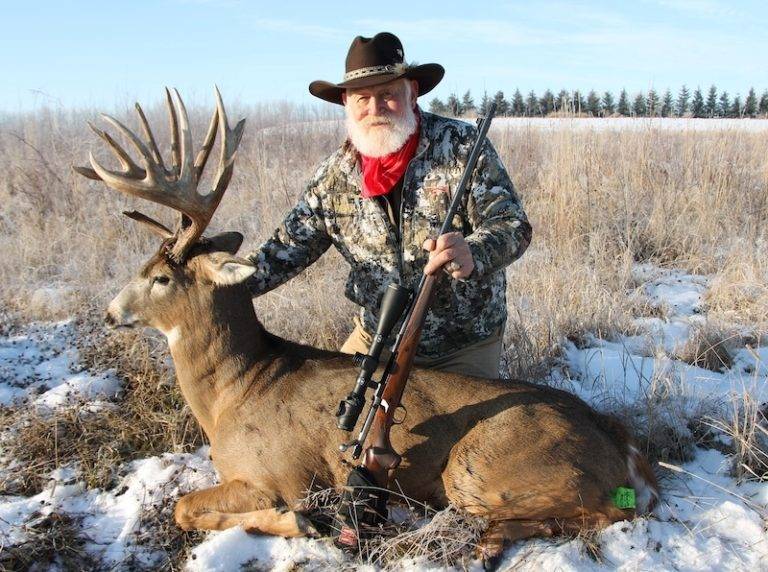Meet Larry Weishuhn, aka “Mr. Whitetail”
Larry Weishuhn, known fondly as “Mr. Whitetail,” has been a cornerstone of the hunting and conservation community for over six decades. From his humble beginnings as a wide-eyed boy exploring the wilds of Colorado County, Texas, to his celebrated career as a hunter, author, television host, and wildlife biologist, Weishuhn’s life is a testament to his enduring passion for the outdoors. He has become an icon in the hunting world with countless adventures spanning every corner of the globe and an unmatched dedication to ethical hunting and habitat conservation. Join us as we explore the incredible journey of a man whose legacy inspires hunters and conservationists alike.
These days, Larry Weishuhn is a legendary hunter, author, television personality, show host, speaker, and guide who is so synonymous with deer hunting that he is referred to as “Mr. Whitetail.” Once upon a time, though, he was just a small-town boy with dirty feet, wild hair, and a passion for pursuing adventure that was bigger than he was.
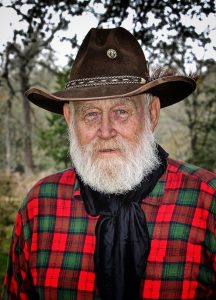
In the close-knit community in Colorado County, Texas, where he was raised, Weishuhn’s parents and everyone around him spoke primarily German. His family owned a farm selling chickens, hogs, and cattle. He was kept busy with farm chores, but as soon as they were complete, he headed into the nearby woods to explore. It was not until he entered grade school that he began fluently speaking English.
Hunting was all around him while he was growing up. His parents both hunted deer and other game. His father loved hunting and loved hounds. Weishuhn remembers always having around 10 to 15 coon hounds around the house at any given time. A lot of Weishuhn’s early exposure centered around running coon hounds while still in diapers, being carted around on his father’s back and fishing with his maternal grandfather, who wanted nothing more than to have a “red-haired grandson to take fishing.”
Deer Hunting has become his Passion
For the first few years of life, Larry spent more time rambling outdoors than within the four walls of his house, so it was quite a culture shock when he grew old enough to attend first grade. “Quite frankly, I thought I had died and gone to Hell,” Weishuhn laughed. “I couldn’t believe I had to go there instead of staying in the woods. To me, being out hunting and fishing was ingrained very early.”
He continued to chase the wild whenever he could outside of school hours and spent any other free time reading about other folks’ adventures in the glossy pages of Field and Stream, Sports Afield, Outdoor Life, and related publications.
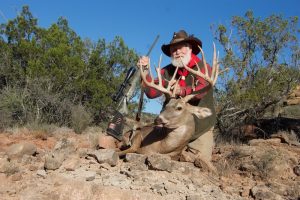
“I just devoured those publications,” he said. “I couldn’t remember any of the things I was supposed to remember at school, but I could quote what Jack O’Connor, Pete Brown, and many of those old-time early writers had to say about cartridges or hunts they were on. Thankfully, I had parents who understood my love for the outdoors.”
He cut his teeth hunting grasshoppers and sparrows in the yard with a .22 before his dad let him graduate to hunting squirrels. Shooting his first squirrel happened with the help of a dog named Hunter, a crossbreed between a bird dog and a hound, who treed the squirrel in a mulberry tree, giving young Weishuhn a clear shot. At around age four, Weishuhn’s father let him come along on deer hunts to sit and observe.
“I begged my dad to let me sit alone,” Weishuhn said. “My dad told me that if I turned six and could prove to him I could use the rifle, an old single-shot 12 gauge from my granddad, he would build me a ground blind to sit in. I had to start in a ground blind because my mother didn’t want me sitting in a tree.”
During Weishuhn’s childhood, the whitetail population in Texas was ravaged by an infestation of screwworm flies. The maggots of these flies ate the flesh of fawns, devastating population numbers for a few years. This made hunting much harder than it is today, but eventually, due to intervention, the screwworm problem was brought under control, and deer populations rebounded.
View a Gallery of just some of Larry’s Accomplishments!
Click Any Image to view the full Gallery.
Deer Hunting – Larry’s first deer
Weishuhn’s first deer kill happened in 1961 as a young teenager. By then, his mother had allowed him to set up in trees, so he was perched in an old oak tree on watch with one shell in the barrel and another clenched between his teeth, just in case he needed it for a second shot.
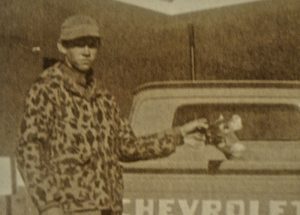
“I was sitting up there and finally heard a sound. I looked down and, oh my God, here comes the world-record whitetail,” Weishuhn said. “It had the most unbelievable body size and antlers.”
In a rush of adrenaline, Weishuhn managed to get off one shot from his grandfather’s single-shot 12-gauge shotgun but accidentally pulled too hard on the shotgun’s fore-end and disengaged the barrel, which tumbled to the ground below. Meanwhile, the buck jumped and bounded away.
Weishuhn rushed down to retrieve the fumbled barrel and then, in a flurry of confusion and excitement, ran in the direction he saw the buck run. He didn’t get far before tripping on the downed buck, which, when he looked down, sported a lovely set of spikes but not exactly the word record rack he was so sure he had seen from the tree. That first harvest remains a cherished memory for Weishuhn, and the love of the pursuit has never left. “I love being outdoors in terms of matching wits with animals and trying to learn as much as I can not only about the animals themselves but also the areas they live in,” Weishuhn said.
Hunters Education and Wildlife Management
That love for wildlife and habitat led him to pursue an education in wildlife biology from Texas A&M University, earning a B.S. in Wildlife Science. After college, he worked as a research wildlife biologist with Texas A&M University’s Department of Veterinary Pathology and the Texas Parks & Wildlife Department, where he was appointed the Technical Assistance Biologist for South Texas, where he worked with landowners and hunters in establishing and maintaining quality wildlife management programs. Later on, Weishuhn left state employment to establish his own wildlife management company, Quality Management, Ltd., with emphasis on habitat restoration and species management, concentrating on such big game species as whitetail deer, mule deer, pronghorn antelope, elk, and desert bighorn sheep. Weishuhn’s quality wildlife management programs have become staples in the industry, and it was this and other extensive knowledge earned him the nickname “Mr. Whitetail.”
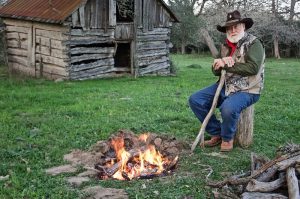
His career, in large part, centered around communicating the outdoors to eager hunters and conservationists. Weishuhn’s research is published in numerous professional journals. He has served as a sought-after expert on conservation and other topics, frequently presenting at significant events, such as symposiums, conferences, and more. He published his first national article in 1970 about research he conducted with a team on desert bighorn sheep.
Personal Philosophy and Legacy
Larry Weishuhn’s philosophy centers around ethical hunting and conservation. He believes in the wise use of land and wildlife resources, mentoring young hunters, and promoting sustainable hunting practices. His contributions have earned him numerous awards and recognition, solidifying his legacy as a conservationist and hunting legend.
As a writer, his work has appeared across many industry publications, including North American Deer Hunter, North American Outdoorsman, Shooting Times, Deer & Deer Hunting, Petersen’s Hunting, Sporting Classics, Game Trails, and several more. He currently serves as the whitetail columnist for Texas Fish & Game, executive field editor for DSC’s Game Trails, field editor for Mule Deer (Mule Deer Foundation), and freelances for numerous publications. He writes regular blogs for Hornady’s Bullet Points, Trijicon Hunt, Dallas Safari Club, Kryptek, CarbonTV.com, Mallette Communications, and H3 Whitetail Solutions. His work contains thousands of feature articles, columns, and blogs. Weishuhn is not only a writer but also an author and has written several award-winning books. See below for his book list.
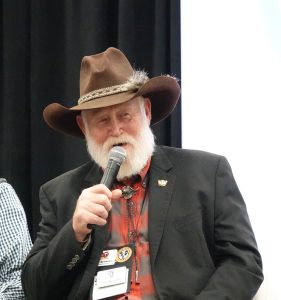
Link to many stories that Larry has written:
- North American Deer Hunter – link to story list
- North American Outdoorsman – Link to story list
Weishuhn is a man of many talents. Beyond the written word, Weishuhn is also a multimedia communicator, having long served as host or co-host for many award-winning outdoor television shows and podcasts, numbering well over 500 episodes. His shows have been awarded numerous Tellys and has been nominated for Emmys. These days, Larry co-hosts the popular weekly “A Sportsman’s Life” on CarbonTV.com and does several episodes each year for “Trijicon’s World of Sports Afield.”
In addition, Weishuhn has been doing a weekly radio segment, “Campfire Talk with Larry Weishuhn,” with Luke Clayton Outdoors, since 2008, which is featured on stations through Texas, Oklahoma, Kansas, Nebraska, Arkansas, and Louisiana, as well as online. He and Luke Clayton also host an additional weekly podcast, “Campfires with Luke and Larry,” for Sporting Classics Daily. In June 2019, Weishuhn launched his popular weekly “DSC’s Campfires with Larry Weishuhn” podcast, which is available through CarbonTV.com and many other platforms.
With all of this under his belt, it is hard to imagine where Weishuhn finds the time for it all. “I’m one of those, thankfully, that gets by with very little sleep,” he said. “If it weren’t for my body telling me I have to lay down and sleep sometimes, I just wouldn’t. There are too many fun things and much to learn in life.”
Despite the joy Weishuhn takes in his work, it hasn’t been all fun and games. His career is steeped with significant contributions to conservation throughout the decades.
He co-founded, with two others, the Texas Wildlife Association in 1985. This organization was formed to protect landowners in Texas, which is 98 percent privately owned, and to give them a voice in policymaking and legislation that would directly affect the way they were able to manage their habitat and the wildlife that lives within it. Another core focus was conservation versus preservation, with conservation being the wise use of land resources instead of complete preservation.
“We saw a shift, even back then, from a rural to an urban society,” Weishuhn said. “People had been removed from the land for one or two generations and didn’t really understand why hunting was important, didn’t understand that hunting was and is conservation. We were looking for a way, among other things, to protect landowners’ rights regarding managing the habitat on their property and having a say in what comes off of it and why.”
Mentoring Youth Hunters
Another aspect of the organization was the Texas Youth Hunters initiative, which has introduced more than 80,000 kids to hunting. “Of all the things I’ve been very fortunate and blessed to do, to me, forming the Texas Wildlife Association was probably the best thing I ever did.”
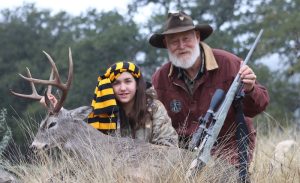
Another organization in which Weishuhn has played an important role is the Dallas Safari Club (DSC). This conservation organization aims to ensure wildlife conservation through public engagement, education, and advocacy for well-regulated hunting and sustainable use.
Weishuhn has been associated with DSC for more than thirty years. He is a life member, has served on several DSC committees, is a former DSC Foundation Board of Directors (he currently serves as an advisor), and continues to be involved as an ambassador and host of the DSC weekly podcast. The DSC has sponsored several of the television shows Weishuhn has hosted and developed, and Weishuhn has led several fundraising initiatives for the DSC.
To Weishuhn, the core ethics set DSC apart from other conservation organizations in the space. “To me, DSC always did the right thing for the right reasons,” Weishuhn said. “Not for the glory of DSC but because it was the right thing to do for the animals, the habitat, or the people in many instances. To me, DSC is by far the finest conservation organization in the world.”
Weishuhn is also heavily connected to several other conservation organizations in his career, including the Houston Safari Club, National Rifle Association, Wild Sheep Foundation, and Mule Deer Foundation, and he is a professional member of the Boone & Crockett Club.
This work has manifested in several achievement awards, including the American Outdoor News Lifetime Achievement Award, the prestigious Zeiss Lifetime Achievement Award (which has only been awarded two other times), and inclusion into the National Legends of the Outdoors Hall of Fame.
Hunting Around the World
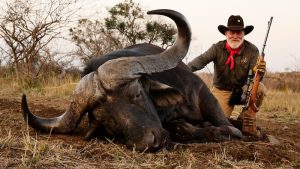
Weishuhn’s work has led him on adventures all across the globe. He has hunted and worked with the big game throughout North America, Africa, South America, Australia, New Zealand, Asia, and Europe. Although known as “Mr. Whitetail,” he has also immensely enjoyed hunting a variety of species, including mule deer, Sitka blacktail deer, Columbian blacktail, Coues whitetail, brocket deer, pronghorn antelope, black bear, elk, moose, caribou, javelina, mountain lion, grizzly bear, Alaskan brown bear, Rocky Mountain goat, red stag, chamois, roe deer, sika deer, fallow deer, Cape buffalo, African lion, eland, kudu (numerous), zebra, and gemsbok. His list of game animals hunted and stories to tell is endless.
Larry Weishuhn, “Mr. Whitetail,” continues to inspire hunters and conservationists worldwide. His passion, knowledge, and dedication to the outdoors have left an indelible mark on the hunting community. Whether through television, writing, or conservation efforts, Weishuhn’s influence remains a guiding light for future generations of hunters. Weishuhn still believes that hunting whitetails has no finer place than a well-managed ranch in South Texas brush country, hunting with his friends Luke Clayton and Jeff Rice in the middle of December when bucks are responding to rattling horns.
Hunting Books – by Larry Weishuhn and friends (available on these websites)
www.catfishradio.org www.larryweishuhn.net
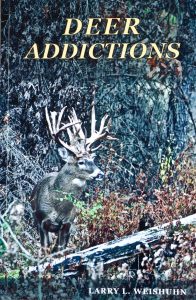
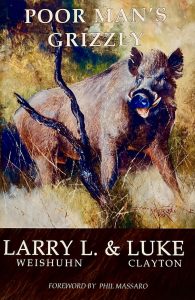
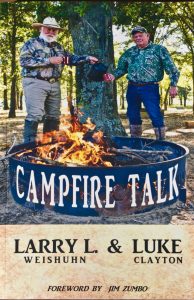
Per our affiliate disclosure, we may earn revenue from the products available on this page. To learn more about how we test gear, click here.



